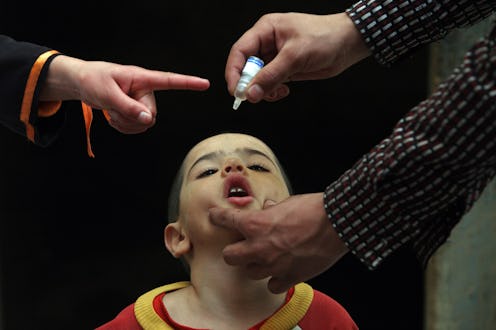News
Why Europe's Kids Are at Risk of Polio
Syria's brand new outbreak of polio, a disease that had been almost completely eradicated from the world, may now be threatening Europe. As rebel forces continue the fight to unseat Syrian president Bashar al-Assad, the rate of polio vaccinations in Syria has plummeted. And now, experts say, the crisis might extend beyond Syria's borders into Europe, where the disease hasn't been seen since a last case in Turkey in 1998. Worse, this new spread could be silent.
German doctors say that because serious complications from polio, like paralysis, occur in only about one of every 200 cases, it may take a while before the spread is detected. By the time one symptomatic patient appears, the disease could have spread to hundreds more.
But Europe vaccinates its kids, so it has nothing to worry about, right? Not quite. Polio vaccinations are practically universal in Europe, but because the disease has recently been confined to distant and volatile areas of the world — Nigeria, Pakistan, Afghanistan, and, recently, Somalia — Europe has used a less potent version of the vaccine to maintain its clear status. The Inactivated Polio Vaccine (IPV) used by Europe doesn't carry the same risk of transmitting the vaccine that the Oral Polio Vaccine (OPV) does, because the latter uses a live version of the virus. The U.S. only uses the IPV vaccine as well. And, though its diminished potency isn't a problem when Europe has no cases of polio, it might become one if Syrian refugees bring the virus.
New vaccination efforts are focusing on Syrian refugees and residents of countries immediately surrounding Syria, which are likely to take in the most refugees. But experts are saying the vaccination effort must be more wide-spread, especially because some European countries — like Ukraine, Bosnia, Herzegovina, and Austria — have very low rates of vaccination.
"Vaccinating only Syrian refugees — as has been recommended by the European Center for Disease Prevention and Control — must be judged as insufficient," the experts wrote. The disease is believed to have returned to Syria after more than a decade of absence through Pakistan.
This is very bad news, as Syria's civil war rages on. The outbreak isn't likely to persuade rebels to put down arms in order to allow health workers to vaccinate children across the country, and peace talks are presumed, but have an uncertain future. By the time they happen — in January, or later — the cases of polio may have multiplied or spread. At least ten Syrian children have already been paralyzed by the virus.
